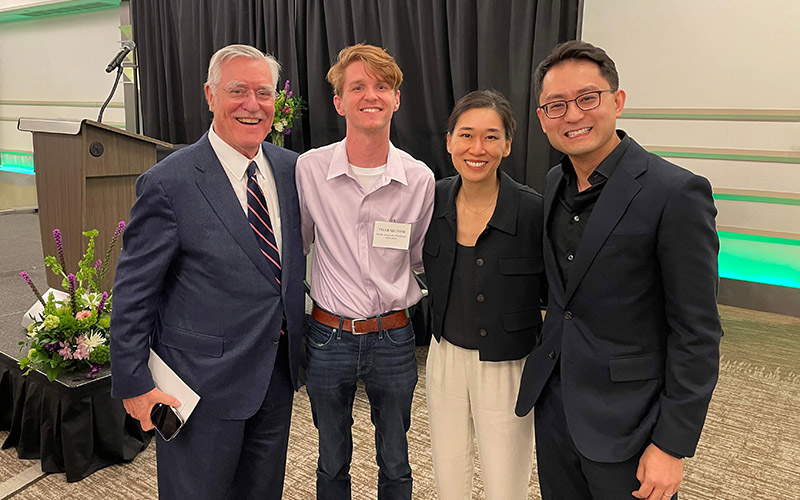
College of Music Dean James Forger joined three members of the Music faculty at the MSU All-University Awards Ceremony in May. Associate Professor of Composition Zhou Tian was honored with the William J. Beal Outstanding Faculty Award, Assistant Professor of Violin Yvonne Lam received the Teacher Scholar Award, and Graduate Assistant Tyler Mazone was awarded the Excellence-in-Teaching Citation.
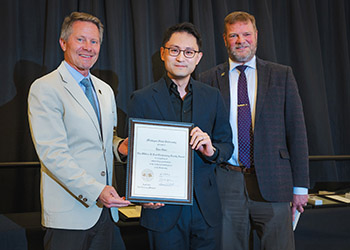
The William J. Beal Outstanding Faculty Award is the highest honor bestowed on faculty at Michigan State University. Since his arrival at MSU in 2016, Zhou Tian’s creative work, teaching, and service have helped propel the Composition Area of the College to national prominence. In 2024, he was presented this award by MSU President Kevin Guskiewicz, left, and Provost Thomas Jeitschko, right.
Two College of Music faculty and a graduate student were recognized at Michigan State University’s annual All-University Awards Ceremony, held at MSU’s Kellogg Hotel and Conference Center in May.
Zhou Tian, associate professor of composition, received a William J. Beal Outstanding Faculty Award in recognition of his extraordinary creative accomplishments and dedication to serving students, colleagues, and the institution. Yvonne Lam, assistant professor of violin, received a Teacher-Scholar Award in recognition of her unparalleled accomplishments as an internationally recognized violin teacher and performer, and for innovative instruction to support the success of her students. Tyler Mazone, a graduate teaching assistant, received an Excellence-in-Teaching Citation in recognition of his skill and dedication as a teacher, and his promise and accomplishment as a composer.
“I’m immensely honored to receive the Beal Award,” Zhou said. “Music composition has always been my passion, and it is humbling and encouraging to be recognized by my peers and the institution at this milestone. It also reflects the support I have received from my family and colleagues. Their belief in me has been a constant source of strength, and I share this honor with them. This award motivates me to continue sharing my love for music and nurturing the next generation of composers.”
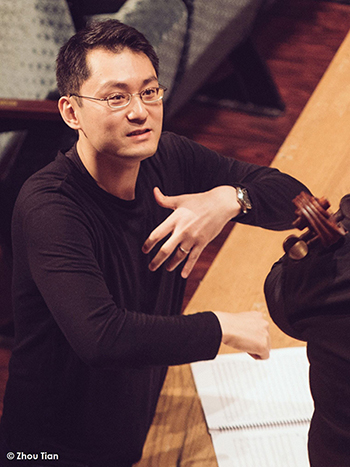
As a composer, Zhou seeks inspiration from different cultures, and his work has premiered around the world to great acclaim.
Since joining MSU’s College of Music in 2016, Zhou’s excellent record of creative work, teaching, and service have helped propel the composition program to national prominence.
As a composer, Zhou seeks inspiration from different cultures and strives to mix them seamlessly into a musically satisfying combination for performers and audiences alike. His orchestral, choral, and chamber works have been performed at many of the world’s most prestigious venues by some of the most prominent orchestras of our time, including the New York Philharmonic, London Philharmonic, and the San Francisco and Shanghai symphonies. His “Concerto for Orchestra,” commissioned and recorded by the Cincinnati Symphony and Louis Langrée, earned him a Grammy Award nomination for Best Contemporary Classical Composition in 2018, making him the first Chinese-born composer honored in that category. In 2022, he became the first Asian-American composer to win the coveted Sousa-Ostwald Award from the American Bandmasters Association.
“Contemporary classical music explores new soundscapes and reflects the complexities of our modern world, addressing emotions in ways that resonate with diverse audiences,” he said. “It also serves as a bridge between the past and the present, preserving classical traditions while infusing them with new life and relevance.”
Zhou is passionate about teaching courses and directing research on a wide range of topics, including applied composition, orchestration, and film scoring with cutting-edge technologies. Within the composition area, he has helped foster an environment that embraces ethnic and cultural diversity, attracting students from various parts of the world. His students have achieved recognition by earning top international composition prizes as well as securing tenure-track positions in prominent institutions.
“In this age of TikTok videos and AI-generated art, it’s more special than ever to make music—live, on stage—with a 70-musician symphony orchestra or wind symphony,” Zhou said. “Writing new music that reflects our time for this centuries-old medium is an absolute pleasure.”
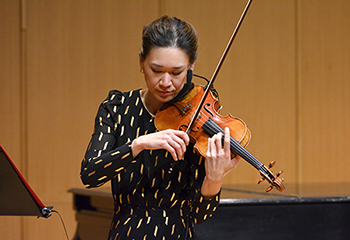
MSU Assistant Professor of Violin and Director of Chamber Music Yvonne Lam, seen here performing at the second Lunar New Year concert she organized at MSU in January 2023, earned a Teacher-Scholar Award acknowledging her excellence as a performer and educator. Photo: Harley J. Seeley.
Lam, the Teacher-Scholar Award recipient, joined the MSU faculty in fall 2019 and since that time has recruited a vibrant studio of violinists and implemented innovative teaching methods—including group meditation and mental performance coaching to support her students holistically.
“It’s never been a goal of mine to win an award for doing my job well, but it is very affirming to be recognized for the teaching and scholarly work that I do,” said Lam. “It confirms that I’m on the right track, and that my contributions are being seen.”
A top prizewinner of several international competitions, Lam has served as assistant concertmaster of the Washington National Opera and as co-artistic director of the music ensemble Eighth Blackbird, with whom she won a Grammy award for Best Chamber Ensemble Performance in 2015. She has commissioned and premiered more than 100 new chamber works, and her first solo release, “Watch Over Us,” is a critically acclaimed album of works composed by women for solo violin and electronics, funded by a Humanities and Arts Research Program (HARP) grant.
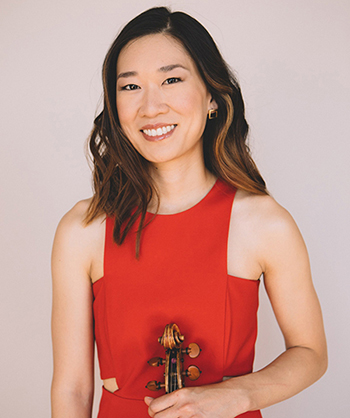
Since joining the MSU faculty in fall 2019, Yvonne Lam has recruited a vibrant studio of violinists and implemented innovative teaching methods. Photo: StephanieBassos.com.
Lam’s doctoral students have earned academic positions at institutions abroad, producing lecture recitals and documents researching underrepresented women composers. They have also won title positions in the Detroit Opera and Kalamazoo Symphony. As head of the chamber music program, Lam invites world-class guest artists to give masterclasses to student groups and sends them out to perform in the community.
Lam is dedicated to diversity in programming. She was a featured artist on WKAR’s first “Music for Social Justice” episode and founded the annual Lunar New Year Concert series in 2021 to present programs highlighting composers of Asian descent.
“I am working to elevate diverse musical voices through the Lunar New Year concert series and the Resonate project, a multi-year collaboration that explores the African Diaspora through the lens of contemporary American chamber music,” Lam said. “My own personal projects also center on composers who have traditionally faced barriers in classical music, such as women and people of color. I have built a thriving chamber music program that puts chamber music at the core of the curriculum instead of on the fringe, and we are seeing the exciting results of an invigorated chamber program in our Wagner Chamber Music Competition and our Chamber Showcase concerts.”
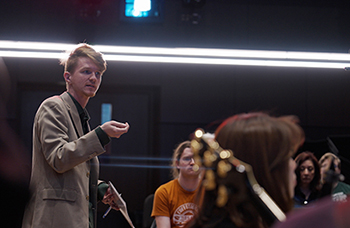
Tyler Mazone discusses his composition with visiting musicians at the College of Music who sight read his piece. While focusing on composition, Tyler is teaching and earned an Excellence-in-Teaching Citation from MSU. Photo: Anthony Valli, ArtsMSU.
Mazone, recipient of the Excellence-in-Teaching Citation, is a Deaf and neurodivergent bass clarinetist and composer who conducts insightful research into music created by composers with disabilities in genres varying from classical and jazz to rock and pop. In his teaching he works to present concepts, skills, and information in multiple modes, so all his students can understand, express, and apply in a tangible way what they are learning.
“It means a lot to me to receive this award,” he said. “I love teaching and mentoring students through learning new things about musicking, and this award is an affirmation to me that I’m on the right path. It demonstrates my varied skills and knowledge in course design, and in teaching undergraduate students.”
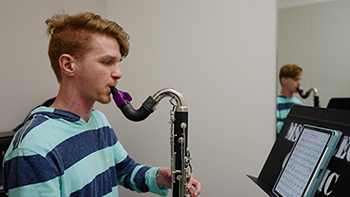
Tyler Mazone is a bass clarinetist and composer. As a Graduate Assistant, he teaches a music theory course for which he has earned praise from students and Music faculty members. Photo: Anthony Valli, ArtsMSU
Those who nominated Mazone for the award described him as a skilled and innovative young composer whose classrooms are active and productive. His students sing in class, improvise, analyze music, and import sampled sounds into audio engineering software to create their own pieces. With little or no prior musical training, students in his classes discuss—insightfully and in sophisticated terms—aspects of music that had been entirely foreign to them just weeks earlier.
“After completing my doctoral degree, I plan to pursue teaching jobs, ideally at smaller universities, and to continue honing my art of composing and performing,” Mazone said.
Mazone is known to bring a perspective and approach to classrooms that is uniquely his. As a Deaf music student, he has cultivated a skill that all musicians work to develop: “hearing” a score just by reading the music without the benefit of sound. This skill helps him to discuss with students the architecture of a work, issues of pitch combination, density, texture and timbral combinations, and technical challenges to individual instruments or voices. As one of his composition students remarked, “I wish I could hear what Tyler hears.”








